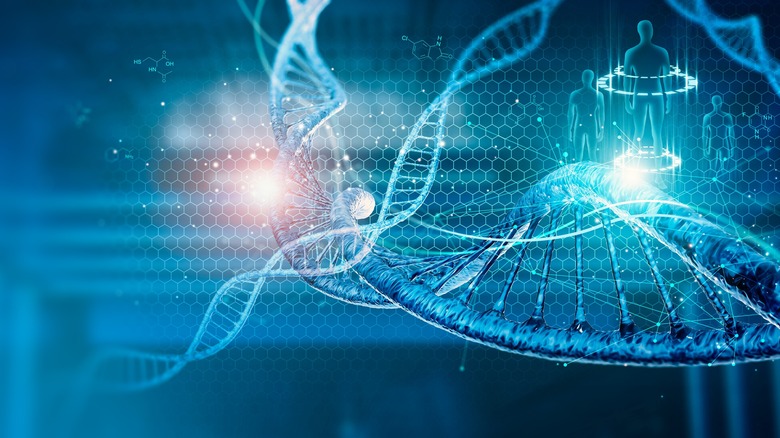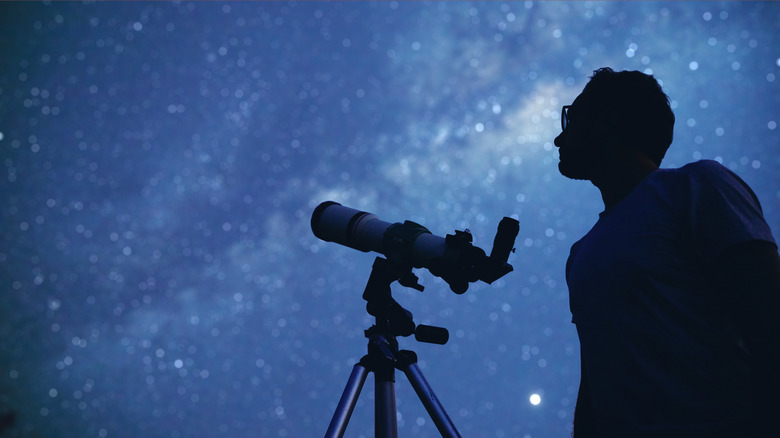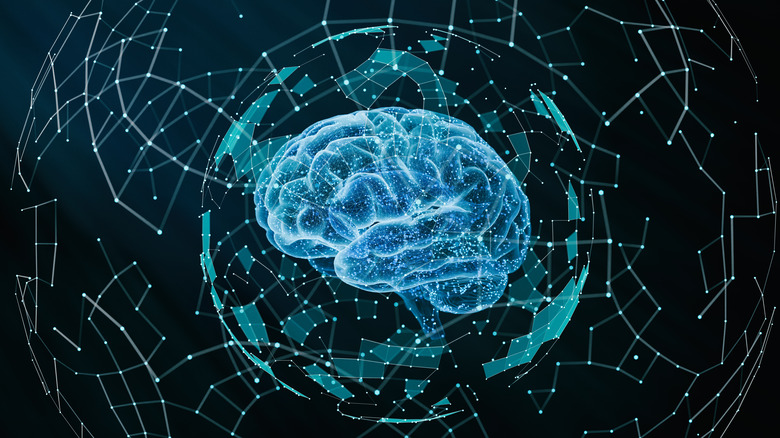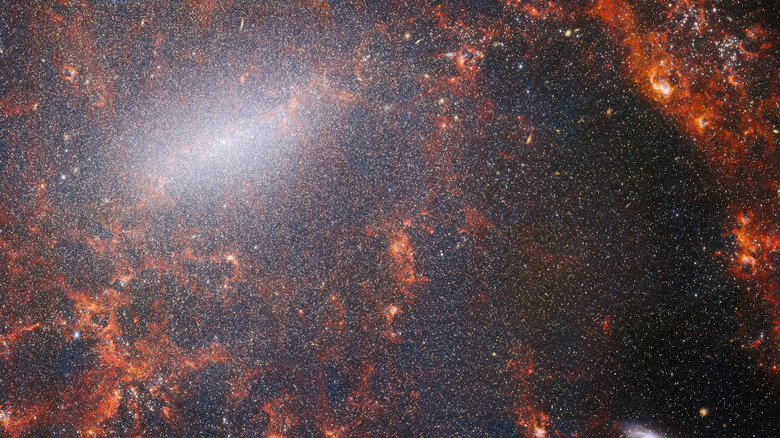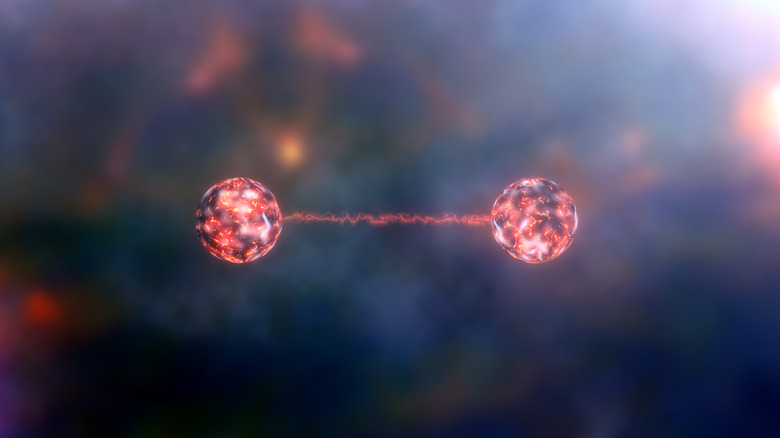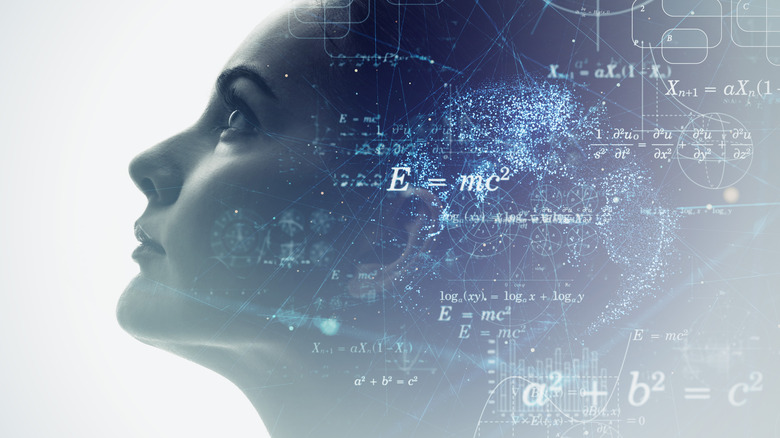The Radical Theory That Says That Life Creates The Universe
Most people think of themselves as individual bodies experiencing an external world. You eat some food, you smell a flower, you put on a shirt — life is a series of events composed of people interacting with objects. So if a researcher comes along and says, "Life creates the universe," how could that be possible? People create houses, paintings, necklaces, cars, but the universe? If anything, conventional wisdom and empirical evidence say that the universe creates us. We're made of elementals, cells, complex chemicals, etc. — materials we share with nature. Cosmic and biological evolution brought us here, and that's that. Easy, right? Well ... kind of.
Biocentrism posits a more complex answer. Touching on astrobiology, simulation theory, ancient philosophy, quantum mechanics, the Theory of Everything, and more — yes, even more — biocentrism is the brain-child of Dr. Robert Lanza. Lanza is a scientist and researcher likened to Albert Einstein, called the "Bill Gates of Science," and who has a list of credentials and awards as long as your arm — in a very tiny font. He refutes the idea of a separate, discrete "out there" universe. The CBC quotes him saying things like, "There is nothing outside of perception ... but the illusion of an external world comes from language. Everyone you meet participates in the same charade." Statements like that place him on a long list of revolutionary thinkers. And in the end, what he really means is: It's all in your head.
The anthropic principle
The modern, very existentially traumatic story of life and the universe goes something like this: Through a series of happy accidents we go from cosmic inflation and the Big Bang some 13.8 billion years ago to the universe's first molecules, stars, galaxies, proteins, cells, etc. Fast forward and you're recovering from a late-night Taco Bell run on a Tuesday morning. Humans exist at the current endpoint of evolution as individual, sentient entities dwelling in a matter-and-energy reality of discretely defined objects that bear out against scrutiny. Things can be measured, understood, and definitely continue existing without us. If we all die, the cosmos marches on oblivious. So on and so on.
And yet, here we are making such observations. Observed things require observers, and vice-versa. Without us and our observations, assessments, evaluations, and experiences, the universe is different. This is what physicist John Wheeler called the participatory anthropic principle (PAP), as Futurism outlines. As Forbes discusses, Wheeler's observation has been misconstrued over time as meaning that the universe — more accurately "God" — is perfectly tailored to create us because we are the ones here to observe it. To this we say in Latin "post hoc ergo propter hoc:" Just because one thing happened after another it doesn't mean the first thing caused the second thing. Nonetheless, the anthropic principle showcases a critical feature of biocentrism, one shared by quantum physics, ancient philosophers, and Neo from "The Matrix:" The idea that reality is a thing constructed by your mind.
All in your head
Looking at your phone, desk, dog, it pays to remember that each of those objects is just a soup of atoms of varying composition and degrees of permeability. You can wave your hand through the molecules of the air, or bite the molecules of a burger. And somehow, the brain converts the senses — taste, touch, smell, sound, sight — into a synthesized, whole "reality." As our old friend Plato the ancient Greek philosopher said: "Reality is created by the mind."
Thousands of years later neuroscience has reached the same conclusions. Neuroscientist and professor at Dartmouth College Patrick Cavanagh says on Stanford University, "It's really important to understand we're not seeing reality. We're seeing a story that's being created for us." He continues, "There's a whole world of visual analysis and computation and prediction that is happening outside of the visual system, happening in the frontal lobes. That's where the 'story' of reality is constructed."
So when Dr. Robert Lanza talks about biocentrism and "life creating reality," this is what he means. On the CBC Lanza reiterates that the universe as we know and experience it — despite what materials and forces compose it — does not exist outside of human consciousness. Furthermore, it's an utter mystery how "lumps of carbon, drops of water, or atoms of insensate hydrogen ever came together and acquired a sense of smell." So is there any reality "out there"? No. Each of us is a locus of a single, cosmic unity.
Everything is God
Even though phrases like "single, cosmic unity" might sound better suited to a New Age workshop, it's exactly what biocentrism implies. The 17th-century Dutch philosopher Baruch Spinoza believed that consciousness exists in the smallest atom all the way to the largest star. Everything comprises an indivisible whole, and everything is God. As the Stanford Encyclopedia of Philosophy summarizes, "God is the infinite, necessarily existing (that is, self-caused), unique substance of the universe. There is only one substance in the universe; it is God; and everything else that is, is in God."
So what is life, then, and the difference between life and non-life? As Big Think says of biocentrism, life is that which is "essential to the makeup of the universe." Life isn't an irrelevant by-product of cosmic conditions, but critical to it — even an inevitable result. Stated in the manner of 9th-century theologian John Scottus Eriugena, life is the fragment of God that God — read "the universe" — uses to know itself. Indian Vedic texts like "The Mandukya Upanishad" say much the same.
Such ideas fit nicely with modern astrobiology, the search for life on other planets. Astrobiology necessitates believing that the universe fundamentally yields life — why else would we search for it elsewhere? And if life defines the cosmos, then in a way it creates and directs it.
The quantum connection
But is it possible that life creates reality in a physical, measurable sense, and not just in an abstract or logical one? The idea might sound whackadoodle. After all, no one can just raise their hands and conjure a pizza from the air. And yet, practitioners of ritual magic — not the kind of magic where you pull a rabbit out of a hat — often talk about will, as Brill says of famed 19th-century occultist Aleister Crowley. Willing things into being, willing things to be true, imposing one's will, etc.
Believe it or not, quantum physicists say basically the same. Part and parcel of quantum mechanics — the weird physics of very tiny objects — is the observer effect. As Discover Magazine reminds us, subatomic particles seem to exist in all possible spins and locations simultaneously ... until they're observed. Simply by looking at a subatomic particle, possibly even just thinking about it, the particle locks into a state. Moreover, particles affect each other over distances, even light-years away. How? We have no earthly clue. Einstein thought this was ridiculous, and was disproven. The individuals who proved him wrong won the Nobel Prize in Physics in 2022.
So thinking back to biocentrism and Dr. Robert Lanza's refutation of observer-observed dynamics, he might be right. Maybe the universe isn't as simple as individual observers gazing at observed things. Maybe the observer and the observed occur simultaneously. If so, then the universe isn't "out there." It's in here.
A Theory of Everything
Ultimately, biocentrism might be a viable candidate for what scientists call a Theory of Everything — a way to combine all existing theories and information about the cosmos into one huge mega-theory that encompasses them all. Most current candidates for a Theory of Everything focus on bare-bones physics, the nature of spacetime, string theory, merging gravity with quantum mechanics, etc. — the mechanics of things, in other words. But as ScienceDirect points out, such a Theory of Everything is a "sterile theory of spacetime" that defines parameters but omits substance. Such theories place physics over biology, while it's biology — per theories like biocentrism — that's the standout characteristic of the universe.
Some researchers go so far as to reinforce thinkers like Baruch Spinoza and say that the universe is one giant, cosmic brain. From galaxy clusters to galaxies, galactic filaments to stars, planets to people — the entire universe resembles an unfathomably large neural network. These connections are commonly called the "cosmic web." In other words, maybe it's incorrect to evaluate reality by the smallest particles and their rules, no matter how they influence things larger than them. Maybe we should evaluate things based on their largest, most holistic and interconnected forms, as well as their greatest emergent properties — like conscious life. If so, then not only could biocentrism prove a viable Theory of Everything, but it would indeed be true that life drives the universe.
